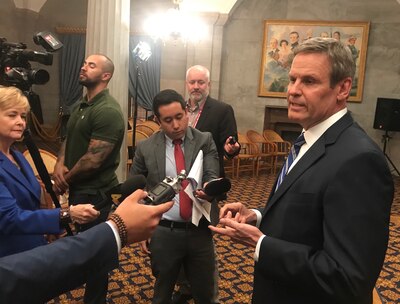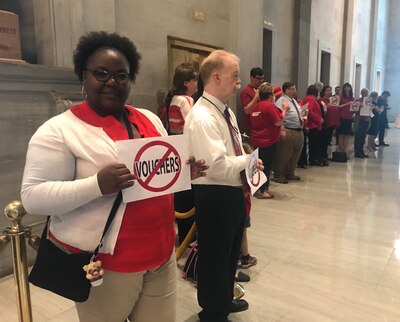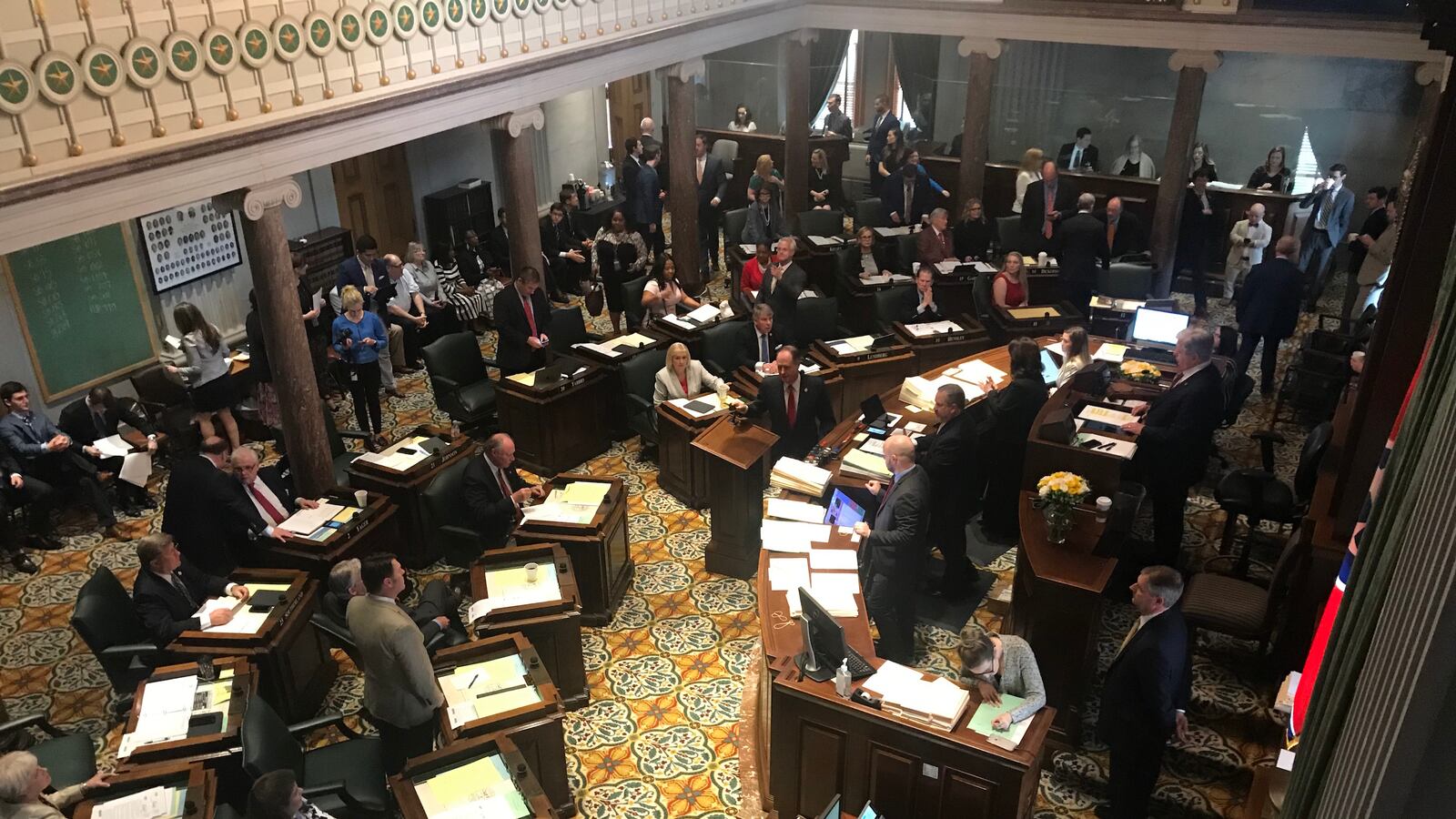Opening the door to a major new education program for Tennessee, the state’s Senate passed a voucher bill on Thursday, sending the controversial legislation to negotiators to hash out differences from a bill that cleared the House earlier this week.
Gov. Bill Lee called the 20-13 vote “historic” and “an important day for the children of Tennessee.” And while significant conflicts separate the Senate bill from the House version that narrowly passed on Tuesday, the Republican governor said he was confident about reconciling disagreements that include funding, eligibility, testing, and which urban school districts will be part of the program.
“This process is one in which things change and you come to an ultimate decision by all parties involved,” he told reporters, “and we’ll see where that lands.”
The vote delivered Lee the the biggest victory of his young administration. Voucher legislation had never before passed both chambers of Tennessee’s General Assembly in numerous attempts over the course of a decade. But under a new governor and aided by significant legislative turnover in the recent election, Lee managed to overcome statewide opposition from groups representing public school teachers, superintendents, school boards, and locally elected funding bodies.
Passage also was a win for President Donald Trump and his education secretary, Betsy DeVos, who huddled with Lee and Tennessee lawmakers during an April 1 visit to Nashville. Both tweeted their support for Lee’s proposal this week and have urged approval of “school choice” bills in both Congress and state legislatures across the nation.
Lee wants his education savings account program to start in 2021 for up to 5,000 students. Their parents would receive the newer type of voucher with an average of $7,300 in taxpayer money to send their children to private schools or pay for other education-related expenses. The program could grow to up to 15,000 students and would be limited to urban districts that are home to some of the state’s lowest-performing schools. Eligibility would be restricted to families whose yearly income doesn’t exceed twice the federal limit for free lunch programs, about $65,000 for a family of four.
But many details must be worked out as legislative leaders seek to wrap up the session in early May. Negotiators must strike a compromise between the two bills that also requires approval by both the Senate and House before heading to the governor’s desk for his signature.
Disagreements include whether to limit the program to students in school districts in Memphis and Nashville or also to include those in Chattanooga and Knoxville; whether to include homeschoolers; and how many state tests that participants would be required to take annually.
But perhaps the biggest sticking point is language in the House bill requiring applicants to submit documents verifying their legal status.
The Senate removed the language earlier this week at the insistence of Sen. Todd Gardenhire, a Chattanooga Republican whose support enabled the bill to squeak out of committee for Thursday’s Senate vote. But Gardenhire’s demand — which he says “is a matter of fairness” to undocumented students who have lived in Tennessee all of their lives — also stands to torpedo the bill in the House. To appease conservative lawmakers, the House added that provision after the Federation for American Immigration Reform warned that the new government program could benefit people without legal authorization to be in the country.
If it stays, the language also could land Tennessee in court because of a 1982 U.S. Supreme Court ruling that requires states to offer public education to all children, regardless of their immigration status. The state’s attorney general has declined to issue a legal opinion.

Asked about the provision, Lee sidestepped his earlier statements that the program should be limited to “legal residents.”
“I think the most important thing is that we create a system that doesn’t allow for fraud, that doesn’t allow for those who should not qualify, that those that are not residents of Tennessee should not qualify,” he said.
Another potential legal challenge could be mounted as a result of Tuesday’s controversial vote in the House. The vote’s legitimacy is being called into question over an unusual parliamentary move that changed the tally’s outcome as Republican Speaker Glen Casada sought to push through Lee’s signature education initiative. Critics say that tactic went against House rules and could violate the state Constitution.
Lee appeared to be unfazed by the process.
“It actually has been encouraging to me the way that the administration, the Senate, the House have worked together to move this process forward,” he told reporters.
The governor said he made no promises and offered no special funding in exchange for votes during weeks of discussions with individual lawmakers.
“[I] told them why I was passionate about it and why it was important to me,” he said. “That has been the way I have approached this.”
Lively debate
Senators debated the merits of Lee’s proposal for almost two hours, including whether the state should mandate a program that could diffuse control by locally elected bodies, even as it gives some parents more control.
“If we’re going to experiment with choice, why are we harming the two districts in the state that already have the most amount of choice?” asked Sen. Jeff Yarbro, a Nashville Democrat who cited a plethora of magnet, charter, and optional schools now available in both Memphis and Nashville.

Sen. Dolores Gresham, who shepherded the Senate bill on behalf of Lee’s administration, said the goal is to give parents a new kind of option, especially in the districts that have the highest concentration of poverty and low-performing schools.
“There’s no reason we can’t have a world-class public education choice in Tennessee and have parent choice,” said the Somerville Republican, who also chairs the Senate’s education committee.
Sen. Raumesh Akbari questioned whether low-income families will be able to parlay a $7,300 voucher into admittance to private schools that cost as much as $22,000 annually in Memphis. And even if they do, the Memphis Democrat worries about students’ adjustment to a significantly different social environment.
“There are people in my district that live in such poverty that they have not seen the Mississippi River. And now we’re going to give them a pass to go to a school for folks who are going to Europe and ski trips for their spring break,” Akbari said.
Yarbro noted that the program is branded as a pilot for just a few districts but predicted that it will spread to other parts of the state. “There’s no reason to think that this stops with two counties. We know where this is going,” he said.
Gresham did not deny Yarbro’s assertion. “It will be up to future Tennessee general assemblies to decide how expansive this program should be,” she said.
The votes came in the same week that discouraging new research was released on a closely watched school voucher program in Louisiana. The study, from researchers at the University of Arkansas, found that math scores went down for students who used a voucher to attend a private school — and that those scores didn’t bounce back, even years later. The findings echo research out of Indiana, Ohio, and Washington, D.C.
Lee said other studies say otherwise and cited research out of Florida, in particular. “I’ve been very encouraged by the results in other states,” he said.

